Blockchain Technology – Key to Modernity
Blockchain technology has been revolutionizing various areas of life, from finance to logistics, for several years now. It is an innovative tool that not only powers popular cryptocurrencies but also finds application in many other domains, ensuring transparency, security, and operational efficiency.
Security of Blockchain Networks – A Key Element in Technological Development
With the development of blockchain technology, new challenges arise, mainly related to network security. Like any novelty, blockchain is also exposed to various cyber threats. Therefore, ensuring an adequate level of network security becomes crucial so that users can benefit from it without concerns about their assets or privacy.
Challenges and Threats to Blockchain Technology
Alongside the increasing popularity of blockchain technology, the number of potential attacks and threats is also on the rise. Commonly mentioned threats to blockchain networks include 51% attacks, vulnerabilities in smart contracts, phishing attacks, Sybil attacks, routing attacks, and DDoS attacks. This is why blockchain security engineers play a crucial role, focusing on designing and implementing security measures to protect networks from various attacks and threats.
Strategies of Blockchain Security Engineering
To ensure a high level of security for blockchain networks, engineers employ various strategies. These include cryptographic techniques, auditing smart contracts, secure network architecture, as well as assessing consensus mechanisms and safeguards.
Despite built-in security features such as decentralization, blockchain technology is unfortunately not immune to attacks. Therefore, engineers must continuously evolve and adapt to changing threats, keeping abreast of the latest trends in digital security.
Future Perspectives in Blockchain Security Development
The growing trends in blockchain security engineering encompass increasingly sophisticated technologies and solutions, such as zero-knowledge proofs, decentralized identity solutions, and post-quantum cryptography. All these efforts aim to provide users with an even higher level of security and trust in blockchain technology.
Blockchain security engineers thus play a crucial role in ensuring the security of blockchain networks and in developing innovative solutions that are more resilient to potential attacks and threats. These actions are fundamental for the development and further adoption of blockchain technology across various aspects of life and business.







